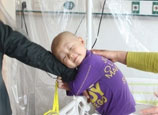
GUANGZHOU, June 24 (Xinhua) -- Drug-sniffing dogs that have worked alongside customs officers wowed civilian spectators across China over the weekend by using their well-trained noses to find drugs hidden in parcels or carried by people.
The events were held in line with a General Administration of Customs (GAC) order for local customs agencies to host public events showcasing the skills of detection dogs, with an aim of informing the public of the achievements in the country's counternarcotics campaigns.
They were also held ahead of the International Day against Drug Abuse and Illicit Trafficking, which falls on June 26 this year.
China faces an uphill battle against drug trafficking, as drug seizures have remained high despite heavy-handed crackdowns.
Drugs including heroin, marijuana and methamphetamine seized in Beijing surged to 60 kilograms in the first five months of this year, up 78.5 percent from the same period last year, according to local police.
In southwest China's Yunnan Province, which borders the Golden Triangle, one of two major opium-producing regions in Southeast Asia, police confiscated 9 tonnes of illegal drugs in the first five months of this year, up 23 percent year on year.
Amid the rise in drug trafficking, police and customs officers have been using well-trained dogs to assist in their investigations and detect drugs hidden in luggage.
Detection dogs are usually selected from athletic but quiet breeds with an acute olfactory sense, according to Zhang Zhuang, an officer at Guangzhou Customs who has trained and worked with detection dogs in Beijing.
The General Administration of Customs has worked with its Australian counterpart since 2005 to import dogs fit for drug-detection work for further training and breeding, he said.
There are currently more than 100 detection dogs serving in China, Zhang said, adding that they were all bred and trained at three facilities in Beijing, Shenzhen and Yunnan.
"Detection dogs are flexible," Zhang said. "They are the real drug detector, with highly developed senses."
When a dog picks up on the scent of drugs in luggage, it rests next to the luggage, quietly signalling to officers that they will need to inspect it. The mild reaction is not a threat to drug carriers, who would be put on alert by loud barking and escape, Zhang added.
In Guangzhou, capital of south China's Guangdong Province, a detection dog named Hei Rui won pets and praise from local residents who watched the dog sniff out drugs in suitcases on Sunday.
Hei Rui, a labrador retriever, has served with Guangzhou Customs for more than four years. The mild-tempered dog has become a star at the agency by sniffing out over 2 kg of marijuana on several occasions, statistics from Guangzhou Customs show.
According to Zhang, prospective sniffer dogs enter an 18-month training program that involves searching, sniffing and courage-boosting lessons. Dogs without the physical strength to endure the tough training, as well as those lacking a strong drive to search, will be eliminated. Qualified dogs are put on a year-long probation at customs before they are officially groomed for service.
Out of ten dogs, only one or two can meet the strict standards. Those chosen as detection dogs work with designated human officers on an eight-hour shift each day, Zhang said.
Dogs that have successfully detected drugs are rewarded a cloth roll, which Zhang said they use to play tug-of-war with their trainers.
Detection dogs usually work for six to seven years before retiring to a special nursing home for dogs, Zhang said.
He also said that dogs that make outstanding contributions to anti-drug campaigns will be rewarded with a decent funeral and a tombstone when they die.
Over the past four years, the eight detection dogs at Guangzhou Customs have helped cracked 159 cases and detected 163 kg of drugs, accounting for 25 percent of the agency's total seizures, according to statistics released by the agency.
















 Childhood in an isolated sterile room
Childhood in an isolated sterile room


![]()
